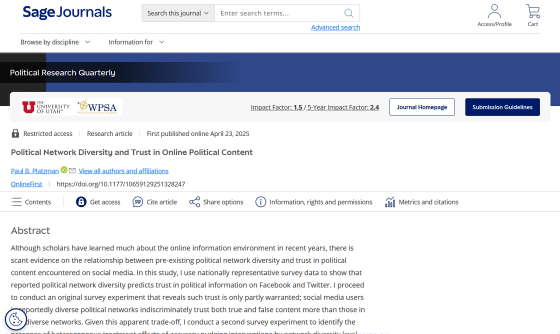What are the unexpected downsides to interacting with politically diverse people?

It has been pointed out that
Political Network Diversity and Trust in Online Political Content - Paul B. Platzman, 2025
https://journals.sagepub.com/doi/10.1177/10659129251328247

Political diversity in your social circle might come with a surprising trade-off
https://www.psypost.org/political-diversity-in-your-social-circle-might-come-with-a-surprising-trade-off/
Social media such as Facebook and X have transformed the way people consume news, highlighting new challenges such as the spread of misinformation. In this context, Paul Platzman , who earned his doctorate at Columbia University in the United States, investigated how the political diversity of an individual's social network affects their trust in political content they encounter online.
'Prior to this study, I was interested in how the composition of Americans' social networks influences their political attitudes, beliefs, and behaviors,' said Platzman. 'Researchers have already shown a number of significant relationships between individuals' network attributes and measurable political characteristics. But no one had studied the relationship between the diversity of an individual's political network and the likelihood that they will accept the political content they encounter online.'
First, Platzman analyzed national data from a social media survey conducted as part of the 2020 American National Election Study (ANES) , which asked more than 3,000 participants about the political makeup of their personal and Facebook friend networks, and how much they trust the political content they see on Facebook and Twitter (now X).
Platzman calculated a 'network diversity score' based on participants' responses and examined the relationship between higher diversity scores and greater trust in social media content. The results showed that people with more politically diverse networks were more likely to trust the political information they saw on Facebook and Twitter. This association was observed even when other factors such as partisanship, ideology, and demographics were taken into account, and it was confirmed that as participants' diversity scores changed over time, so did their trust in political information.

To see if this increased trust in political content was justified, Platzman conducted a follow-up study in which he exposed 550 US adults to political headlines that mixed facts and falsehoods, as well as mock Facebook posts that contained images and layouts that mimicked real social media posts. Subjects rated the accuracy of each headline and indicated whether they would share the post.
Before seeing the headlines, participants also answered questions about their political networks, such as 'how often do you talk about politics?' and 'how much disagreement or diversity did you perceive in your conversations?' Platzman then assessed the diversity of participants' political networks.
The results of the experiment showed that people who belong to politically diverse networks were more likely to believe headlines and to report sharing content. The problem was that these tendencies did not depend on whether the content was factual or false. In other words, people who belong to politically diverse networks are not better able to discern truth, but rather are more likely to believe the political content they encounter online, regardless of whether it is true or false.
Platzman also conducted a follow-up study of more than 2,000 subjects to explore how politically diverse networks would respond to an 'intervention aimed at improving accuracy.' As in the previous experiment, subjects were asked to rate mock Facebook content for accuracy and likelihood to share it, but this time some headlines were given 'fact-check labels,' and some subjects were shown messages warning them about the presence of false information online.
The results showed that fact-check labels and warning messages influenced how participants judged the veracity of content, but that people with more diverse networks responded no more than those with less diverse networks to interventions aimed at improving their judgment.

'Having a politically diverse network is neither inherently helpful nor harmful in distinguishing fact from fiction in online content,' Platzman said. 'As a result, media and tech platforms that deploy fact-check labels and other accuracy-enhancing interventions should optimize the delivery of these interventions to users who are most likely to reduce trust in misinformation, while avoiding reducing trust in fact-based content or creating unwarranted trust in questionable content.'
In this study, the indicators of political network diversity were based on self-reporting, which may not accurately reflect the social environment. Also, the experiment used content that mimicked social media posts, so it is unclear whether the results would hold true in a real-world online environment.
Still, psychology media PsyPost said, 'The study sheds new light on a largely overlooked factor in how people engage with information online. While political diversity in social networks is often seen as a way to reduce polarization and prejudice, it can also carry unintended risks. When it comes to online content, being surrounded by a diversity of opinions may not make people more insightful, but simply more trusting.'
Related Posts:
in Science, Posted by log1h_ik







